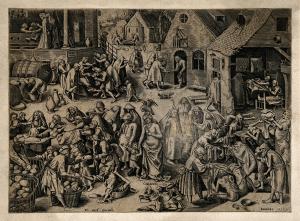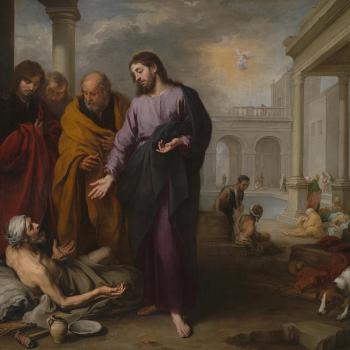
My confreres, our inheritance is the poor, the poor; pauperibus evangelizare misit me. What happiness, gentlemen, what happiness! To do that for which our Lord came from heaven to earth, and by means of which we too shall go from earth to heaven, to continue the work of God, who shunned cities and went to the countryside to seek the poor. – St. Vincent de Paul [1]
Christians need to conform themselves to Christ. Certainly, they cannot do it alone. They need grace. But they must do more than merely receive grace. They must engage it, activating it in their lives. They must allow themselves to become changed by it instead of resist it. They must not assume that grace alone without any attempt or desire to conform themselves to Christ will lead to beatification. They must conform their will with Christ. They must become the body of Christ and so continue the work of Christ in history, sharing his love and grace to everyone around them.
Most Christians start their spiritual journey, their Christian walk, far from the ideal presented by Christ. They must turn to him as their exemplar. They must find a way to imitate him. The more they do so, the more they activate the grace which he has given, and the more they are able to embody Christ in history.
To do this, Christians need to find those spiritual practices which will help change them and their personal habits so that they can properly conform themselves to Christ. One of the most important, indeed, one of the most foundational practices which Christians can engage is almsgiving, or other acts of charity and good will. Indeed, it should be at the forefront of the Christian life. If they embrace its spirit (and not just give out of rote legalistic expectation), they exercise their own sense of love and compassion for others, allowing it to grow so that they find themselves becoming better representatives of God’s love to the world. The more they embrace such love, the more they will feel sorrow for their failure to love, to the harm they have done to others as a result of their failure to love. And so, the more they will give of themselves, working to overcome the damage they have done as a result of their sins.
We begin our journey by engaging simple forms of charity. Giving a few alms here, listening to someone in need and giving them good advice there, all represent ways in which we can begin to form ourselves in imitation of Christ. The more we give, the more we truly give of ourselves out of love, the greater we can become, so that we will eventually live and act in the world with care and concern for all.
Not everyone has the same resources. Many people are poor, and are barely surviving with the little money they possess. They might not be able to give alms, but they can and do give of themselves to others. It is not about the amount they give, but what is growing in their heart. Those who have resources and do not give do not engage their heart properly; but those who do not have them, and yet desire to share their love with others, can and will grow more in what little they share than those with extreme wealth who give only a small portion of what they can give. In this way St. Peter of Damaskos reminds us that we do not need possessions in order to have a charitable spirit:
Not that it is necessary, of course, to have property in order to show mercy. Possessions, rather, are a great weakness. Indeed, it is better to have nothing to give and still be full of sympathy for all. And if we do have something to give to those in need, we should ourselves be detached from things of this life, and yet feel deeply involved with our fellow men.[2]
It’s not what is given which indicates greatness, but the heart behind such giving. If someone who is worth billions would give away millions, and so selfishly hold onto and protects the rest of their extreme wealth, they will gain very little from their almsgiving. On the other hand, someone can have no money, offer a hug to someone in need, and truly give of the heart and continue to grow in love and grace, transforming themselves so that they become more Christlike. Thus, as Abraham Isaac Kook realizes, to be a great philanthropist is to have the right heart:
In the genius of compassion of a great philanthropist, to whom acts of compassion and goodness are his soul’s commitment and the ornament of his life, the inner probing will recognize the splendor of compassion itself, which is more precious and exalted than all the deeds of compassion and action that are carried out in action. [3]
Because most of us do not have such a beautiful, charitable soul, we must do our part to build it up. We must give alms. We must train ourselves to look to those in need and help them. We must learn how to love others. We must truly take them into our heart. We must truly care for them and their wellbeing. Or, as Albert Schweitzer writes, we must extend our love for ourselves to others, so that we maintain and promote all life, and not just our own:
Ethics, therefore, consists in this: I feel a compulsion to extend to all the will-to-live around me with the same reverence for life that I extend to my own. The fundamental principle of morality so necessary for thought is given here. It is good to maintain life and to promote life; it is evil to destroy life and to restrict life.[4]
In saying this, it is important to point out that in our imitation of Christ, we must follow his example, and so act in such a way to give preference to those who are in most need of what we can offer. This is what the preferential option for the poor represents. It does not mean we reject anyone from our love. We are to love everyone. But it means we must deal with those with the most immediate need, those who find their lives being destroyed by poverty and neglect. We must realize the structure of sin has caused them to be in such an unjust situation. As sin violates justice, we must promote justice. Thus, even if we cannot give them alms, we can work for justice, overturning those structures of sin which have harmed them and their dignity, indeed, those structures of sin which threaten to extinguish their lives.
But what, someone might ask, are we do to do make sure we are not fooled by those who are not truly in need? St. John Chrysostom tells us not to think about such concern because we can find some excuse to say why anyone should not be helped. If Jesus acted that way with us, we would not have any share of his grace. What we must be concerned about is what is in our hearts, with our desire to help, and then banish from our thoughts all objections which would get in the way of charity:
And when it is the opportune time for almsgiving and philanthropy, correct the poverty, do away with the hunger, deliver yourself from the affliction, do not busy yourself any further. For, in truth, if we are going to examine lives, we will never have mercy upon any human being; rather, hindered by this inopportune meddlesomeness, we will remain fruitless and destitute of all help, and we shall submit ourselves to great toil to no purpose and in vain. For this reason I now beg you truly: banish far from us this ill-timed curiosity, and give to all who have need, and do this abundantly, so that we may obtain much mercy and the philanthropy of God on that day, which may we all attain by the grace and love toward man of our Lord Jesus Christ, to who belongs the glory, might, and honor, together with the Father and the Holy Spirit, no and always, and unto the ages of ages. Amen.[5]
We want mercy. We know how far we are from the justice which we should possess. We know how we have squandered God’s grace. Thankfully, he does not use our sin as an excuse to withhold his aid to us. If we want to conform ourselves to Christ, we must conform ourselves to his ways. We must take the grace which has been given to us, unite with it, and let it transform us so that we can be more like God. The more mercy we receive from God, the more we should become like God and be merciful to others. The more we receive from God’s bounty, the more we should be like God and share that bounty with others. If we do not have financial or material resources to give, this does not mean we cannot grow in our heart, giving to others our love and respect, allowing such a gift to help us grow in love. Then, if we ever have material resources to help others, we will be ready to give and share it as well, as Kook states:
This genius of compassion sometimes appears among the poor, except that the majestic holiness of a compassionate life always remains in their hearts, only occasionally expressing itself in philanthropic acts. When the predisposition to philanthropy should come upon the opportunity to act, this spirit will be even more wonderful. But those who judge life on the basis of its true meaning, those who mediate on ideas in their purity, will recognize the nobility of compassion even when it is covered up with many veils because of an inability to manifest itself.[6]
The poor and needy should not feel as if they are any less compassionate if they are unable to share what they do not have with others. They should not feel ashamed if they cannot give alms. They are not at a loss merely because they do not have money. The point of almsgiving is about the transformation of the heart. Those who have material means and do not share cut off such a transformation, and so they must be reminded to give. They should be reminded what Scripture says about alms. “For almsgiving delivers from death, and it will purge away every sin. Those who perform deeds of charity and of righteousness will have fulness of life; but those who commit sin are the enemies of their own lives” (Tob. 12:9-10 RSV). And so, St. Cyprian explains, it is those who are covetous, those who hold onto their love of money and material gain, who need to be warned what could happen if they do not overcome their avarice:
And that the indolent and the barren, and those, who by their covetousness for money do nothing in respect of the fruit of their salvation, may be the more ashamed, and that the blush of dishonour and disgrace may the more strike upon their sordid conscience, let each one place before his eyes the devil with his servants, that is, with the people of perdition and death, springing forth into the midst, and provoking the people of Christ with the trial of comparison — Christ Himself being present, and judging — in these words: I, for those whom you see with me, neither received buffets, nor bore scourgings, nor endured the cross, nor shed my blood, nor redeemed my family at the price of my suffering and blood; but neither do I promise them a celestial kingdom, nor do I recall them to paradise, having again restored to them immortality. But they prepare for me gifts how precious! How large! With how excessive and tedious a labour procured! [7]
We want God’s love to abide in us. “But if any one has the world’s goods and sees his brother in need, yet closes his heart against him, how does God’s love abide in him?” (1Jn. 3:17 RSV). If we want that love, we must make room for it. We must open ourselves up to love and we do that by acting on they love and grace which we have , exercising it, and helping it grow. The more we seek God’s love, the more we should act towards others in love. Then, as we continue our spiritual journey, we will slowly find ourselves becoming not only vessels in which God shares his love, but representatives of that love who help establish and bring about the kingdom of God in history.
[1] St. Vincent de Paul, “Conference, 17 May 1658” in Vincent de Paul and Louise de Marillac: Rules, Conferences, and Writings. trans. Hugh F. O’Donnell, Frances Ryan, Louise Sullivan, Vie Thorgren and Edward R Udovic (New York: Paulist Press, 1995), 128.
[2] St. Peter of Damaskos, “The Seven Commandments” in The Philokalia: The Complete Text. Volume Three. trans. G.E.H. Palmer, Philip Sherrard, and Kallistos Ware (London: Faber and Faber, 1986), 97.
[3] Abraham Isaac Kook, “Lights of Holiness” in The Lights of Penitence, Lights of Holiness, The Moral Principles, Essays, Letters, and Poems. Trans. Ben Zion Bokser (New York: Paulist Press, 1978), 235.
[4] Albert Schweitzer, The Animal World of Albert Schweitzer. Trans. and ed. Charles R. Joy (Boston: Beacon Press, 1950), 168.
[5] St. John Chrysostom, On Repentance and Almsgiving. Trans. Guys George Christo (Washington, DC: CUA Press, 1998). 149 [Homily 10: A Sermon on Almsgiving].
[6] Abraham Isaac Kook, “Lights of Holiness,” 235.
[7] St. Cyprian, “On Works and Alms” in ANF(5):482.
Stay in touch! Like A Little Bit of Nothing on Facebook.
If you liked what you read, please consider sharing it with your friends and family!











